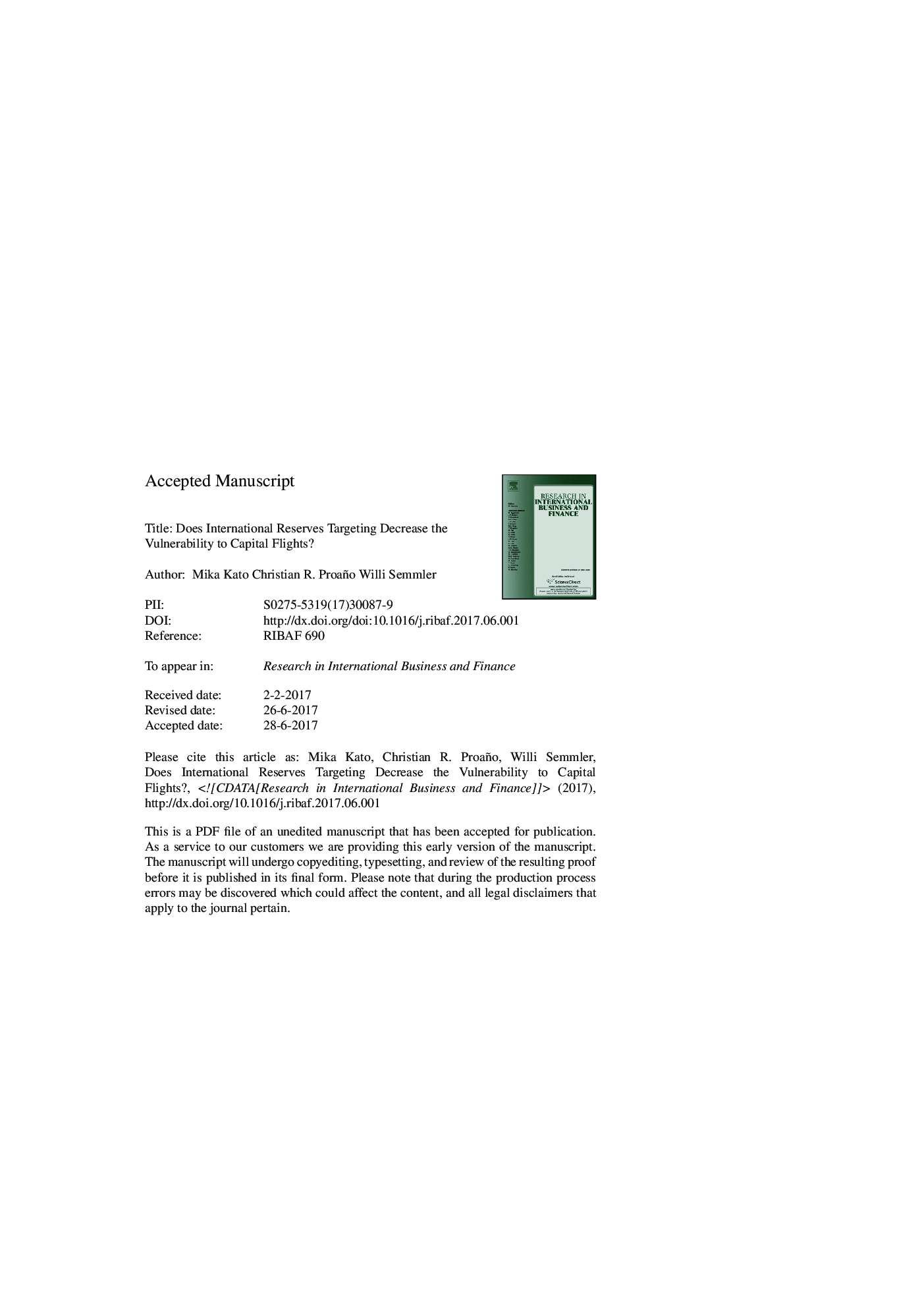| کد مقاله | کد نشریه | سال انتشار | مقاله انگلیسی | نسخه تمام متن |
|---|---|---|---|---|
| 7413810 | 1481790 | 2018 | 21 صفحه PDF | دانلود رایگان |
عنوان انگلیسی مقاله ISI
Does international-reserves targeting decrease the vulnerability to capital flights?
ترجمه فارسی عنوان
آیا ذخایر بین المللی که هدف قرار می گیرند آسیب پذیری را به پروازهای سرمایه کاهش می دهد؟
دانلود مقاله + سفارش ترجمه
دانلود مقاله ISI انگلیسی
رایگان برای ایرانیان
ترجمه چکیده
بخش های متعددی از آشفتگی مالی مانند بحران ارز آسیا در سال 1997-1998 نشان داده اند که اقتصادهای بیشتر در معرض خطرات ارز قرار دارند، اگر ذخایر ارزی آنها کم و توسط سیاست های بانک مرکزی هدف قرار نگرفته باشند. این مسائل به تازگی دوباره مورد توجه قرار گرفته است؛ چرا که در ابتدای سال 2016، با توجه به ارزش چین، می توان از رکود قابل توجه سرمایه چشم پوشی کرد؛ اما به دلیل وجود ذخایر ارزی بزرگ توسط بانک مرکزی چین در مقابل این زمینه، ما در طراحی چارچوب قوانین سیاست پولی مطلوب در یک چارچوب نظری که در آن سرمایه گذاران خارجی به صورت غیر خطی به تکامل ذخایر ارزی بانک مرکزی واکنش نشان می دهند، مطالعه می کنیم. ما نشان می دهیم که با اجازه دادن به بانک مرکزی به میزان قابل توجهی مثبت وزنی به سطح ذخایر احتمالی خارجی به عنوان یکی از اهداف آن، می توان از سناریوی بحران ارز جلوگیری کرد، در حالی که چنین بحران احتمالا زمانی رخ می دهد که این وزن صفر یا به اندازه کافی باشد کم. تأثیر کنترل پولی بانک مرکزی بر خروجی، نرخ تورم و سطح ذخایر خارجی، آسیب پذیری اقتصادی را برای ذخایر ناکافی ذخایر ارزی را تأیید می کند. با استفاده از شبیه سازی های عددی، ما نشان می دهیم که هر چه بزرگتر از مقدار نسبی ذخایر خارجی در تابع از دست دادن بانک مرکزی هدف قرار گیرد، دامنه جذاب تعادل پایدار که اقتصاد آن آسیب پذیر به ضربه های سرمایه ای نیست، بزرگتر است.
موضوعات مرتبط
علوم انسانی و اجتماعی
مدیریت، کسب و کار و حسابداری
کسب و کار و مدیریت بین المللی
چکیده انگلیسی
Numerous episodes of financial turmoil such as the 1997-1998 East Asian currency crisis have shown that economies are more vulnerable to currency runs if their currency reserves are low and have not been targeted by central bank policies. These issues have recently become again relevant as a significant capital flight could be observed with respect to China's currency by the beginning of 2016, which however did not develop to a full fledged currency crisis due to the availability of large currency reserves by the Central Bank of China. Against this background, we study the design of optimal monetary policy rules in a theoretical framework where foreign investors react in a nonlinear manner to the evolution of the central bank's currency reserves. We show that by allowing the central bank to give some significantly positive weight to the level of precautionary foreign reserves as one of its targets, a currency crisis scenario can be avoided, while such a crisis is likely to occur when this weight is zero or sufficiently low. The effects of the central bank's monetary control on the output, the inflation rate, and the foreign reserve level corroborate the economy's vulnerability for insufficient foreign reserves targeting. By means of numerical simulations, we show that the larger the relative weight of the foreign reserves target in the central bank's loss function, the larger is the domain of attraction of the stable equilibrium where the economy is not vulnerable to capital flight shocks.
ناشر
Database: Elsevier - ScienceDirect (ساینس دایرکت)
Journal: Research in International Business and Finance - Volume 44, April 2018, Pages 64-75
Journal: Research in International Business and Finance - Volume 44, April 2018, Pages 64-75
نویسندگان
Mika Kato, Christian R. Proaño, Willi Semmler,
